
Contemporary Music Instruction and Mentoring
Teaching and Mentoring
Here is what I do, and
what I'm looking for in new students
I am very selective about who I accept as students. My teaching schedule is always full, and I have extremely low turnover. This allows me to choose my students. I try to choose those who have musical goals and are willing to do the hard work that it takes to accomplish their goals. I seek students who live and breathe music. My ideal student is one whose parents almost have to pry them off of their instruments to go to school or to bed. All of my students are working towards becoming well rounded musicians. Most are learning multiple instruments and vocal, at the same time. My specialty is helping them develop the skills and knowledge to become highly sought-after performers.
I might be able to make room for you in my teaching schedule, if you:
- already play an instrument and/or sing at an intermediate or advanced musical level
- want to move to the "next
level" and play contemporary music live, either solo or
in a band or both
- want to develop skills in
piano/keyboard, acoustic guitar, electric guitar, bass
guitar, and contemporary vocal
- want to be able to play covers by ear, transpose, improvise, harmonize, arrange songs, and write original songs
- crave knowledge of the
other aspects of live performance (including marketing,
booking gigs, buying/setting up/programming/maintaining
musical instruments and sound equipment, finances, how
to care for your voice, etc.)
- are willing to put in the
work it takes to achieve excellence
- live in Cache Valley, Utah
Examples of things I do differently than other teachers: on keyboard, I teach chord inversions and note spacing for pleasant tonality and how to create rhythms to fill out the sound but not distract from the song. On guitar I teach both using a pick and fingerpicking, and I explain why chords are named what they are, rather than just how to play them. On bass, I start with playing by interval numbers and chord progressions, then later by note names. With less experienced students I do teach them to read music. With advanced students who already know how to read music I don't place as much emphasis on sight reading sheet music, because that's not an important skill in contemporary music performance. Instead, I emphasize playing by ear, and writing/reading/modifying chord charts, including so-called "Nashville" notation (using Roman numerals).
In all my instructional and mentoring activities, my first priority is the well being of the student. I can't do my job of helping students grow and improve without offering correction and criticism, but I use a positive approach that reinforces the student's confidence.
I do not do recitals. When my students are ready, I help them find real performance opportunities for real audiences. In the early stages, I support them not only by attending, but also by supplying and running the sound system, and sometimes by playing bass or another instrument along with them to give them emotional support and build confidence. I do this at no charge.
If this sounds like what you have been looking for, and you (or your child) meet the criteria listed at the top of this page, I invite you to contact me to schedule an audition. What I will be assessing at the audition is:
1. a hunger for performing for audiences; a motivation to touch the lives of others with music, not merely for self enjoyment
2. a desire to become a true musician and understand how music works, not just to play an instrument or sing
3. a pre-existing level of musical knowledge and technique gained from prior lessons and practice, sufficient to be prepared to understand and implement what I teach
4. exceptional musical talent; and
5. a rock solid commitment to make the sacrifices of time and energy necessary to achieve excellence
Of those five things, #5 is the most important.
My existing students are also required to meet these expectations. If there is an ongoing pattern of not practicing, I will let a student go to make room for another new student who is willing to consistently make practicing a high priority.
To schedule an audition, please email me at:
irvnelsonmusic@gmail.com
(NOTE: I prefer emails for communications with prospective students, rather than texts or phone calls. If you email me but don't hear back from me within a few days, then feel free to call or text me at 435-770-2175. Thank you.)
STUDENTS' AND PARENTS' COMMENTS
TUITION RATES AND POLICIES
STUDIO LOCATION